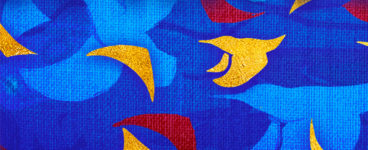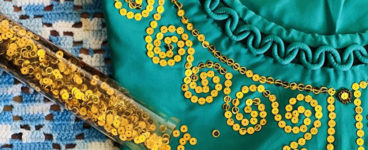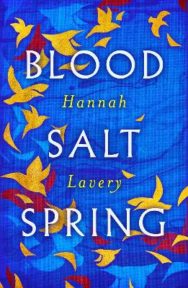‘I am more than a sum of my parts… I am all of my parts – all at once.’
Edinburgh’s Makar Hannah Lavery’s debut collection Blood Salt Spring, explores nation, race and belonging. It is stirring, vital reading as these poems testify.
Blood Salt Spring
By Hannah Lavery
Published by Polygon
Blood Salt Spring – a making of a collection.
I grew up in Edinburgh, mixed race girl, in the 1980’s and 90s.
I am a daughter of a white mother and a black father.
I am the eldest of six.
I am a friend.
I am a wife.
I am a mother of three children.
I am one of many.
I am many things.
I write poems about all this and none of this.
I write for empathy.
I write to say wake the fuck up.
I write to wake myself up.
I am struggling to find belonging here.
Do you live here too?
Blood Salt Spring, my debut collection, was published earlier this year. Today, I am attempting to write about it…
How do I do that?
How should I begin?
I began this collection in blood- bleeding out. Looking for the way my blood pooled- where it would take me?
Where do you come from?
I am the granddaughter of a refugee, of a war bride, of a beautiful black woman – a woman that was the beating heart of my childhood.
Surely, this is where I begin?
And I do
in her wee Scottish kitchen, stirring in cannonballs of peppercorn.
I start with her voice as she remembers her long walk from Rangoon to Calcutta. As she remembers the fragile history she carries- broken bones and rubies. Haunted by her Jamaican grandmother, forced to survive by her Indian mother.
In my poem Cartographer’s Trap which is a reference to the map makers practice of making up a place on their maps- a made up place- to show they made it- that the map belonged to them. I come from all the pink on that old map. I remember that my grandmother came from a place, from a reality that no longer exists, that has been wiped away, that has been erased (how do you find roots in that?) a secret wee piss stain.
Is your collection a memoir, then?
I…
A cartographer’s trap?
Where is this bleeding coming from?
Claudia Rankine in her collection Citizen, talks of John Henryism. The process of being worn down by racism..
‘… you are reminded that a friend once told you there exists a medical term — John Henryism — for people exposed to stresses stemming from racism. They achieve themselves to death trying to dodge the build up of erasure. Sherman James, the researcher who came up with the term, claimed the physiological costs were high.’ Claudia Rankine, Citizen
I started the collecting for this collection in lockdown. Gathering in my voice ( my voices) in the year we were locked in, set apart and made witness, made subject, subjected to the loudest conversation in Scotland around race, racism and the legacies of colonisation that I have ever known. Conversations we had been trying to start with damp twigs were suddenly on fire. Words that we had been sharpening in the corners, started to cut through and it cut us, we bled. They wanted us to bleed.
What does it feel like?
Tell us about your pain?
Here in the Blood, there are poems which are rooted in the reality of living brown in this country. Someone once said to me, it feels like there are two Scotlands ( I think there are more than that) the one they live in and one that we brown and black people live in.
You want to know about that?
I will find it here in the blood- in the bleeding- like a witch I will divine for you (for me?)
But, there is my dad- returned to us from the Gods- turned into a kingfisher, punished and reborn. There are my sisters. There is my mother. There is my fight, there is my anger, there is my hurt, there is my longing. There is me, there is me, there is me…
‘In the morgue, I weep over your body’
Did you think to take me apart like a sum?
One part this, three parts that. Black. Brown. White. Half Caste. Mixed. Shared. Other. – Scottish?
No?
What is it to only see yourself in others’ reflections- to be only ever seen in others’ reflections – in a gaze that reduces you?
‘In the half-caste union/ match your shade.’
Salt
our old wounds- it is a familiar sting.
‘their conversations continue/ a drone under…’
In 2020, in our locked-in worlds, in our grief, and in our preemptive grief- we started to speak to each other.
Sorry, I was on mute.
A front page of the first victims of Covid. Nurses like my Dad was. The colour my Dad was. That smile in the last column of faces- is that no Dad’s smile?
Is he no, just like my Dad?
‘you already claimed him/you wore out his heart’
That video of George Floyd that I didn’t need to see. That I did not need to see.
That they wanted us to see – you seen this?
The conversations sprung from that, from all of that, that were for … Who?
We’d been talking already.
Salt our wounds.
‘the struck are silenced/ (as they always were)’
Is this a journal?
In some ways.
But this year is a collection of all the years before. This collection is a collection of voices, all my voices, from all those moments, from all those years, from my years that built up to… That attempted to erase me.
‘We sort of laugh, wonder how long it will be, before they move on.’
You see, those promises they made to us, they made them before.
Not me?
No, not you (but it was you all the same).
We are not the same.
No.
How do we navigate it now- this world?
In the haibun, prose becomes distilled into haiku. It was distilled, a concentration. It was a neat nip- a shot- in the dark. The prose failed us. Form left us and we fractured into fragments…
We are many
many things.
One of many…
I am one of many
I am many…
How do I return to myself?
How do I see myself again, not as I have been seen, but how I am?
I am just…
In the Spring – in the returning light ( I find the way back or the way through).
I am more than a sum of my parts… I am all of my parts – all at once.
Green
After Mary Oliver
First to remap it/ I fear I was drawn in border lines.
Gates with rotting signs. Trace indentation-
finger, feather, frost- father…
The lichen spume- the way green shatters and splints over time.
I hold a thrush with a broken wing.
Find a place in the airing cupboard-
it dies without seeing the sky.
What have I done?
(the fragility of a leaf spine- insects under rotting timber- remembering a truth- your mother)
forgive forgive forgive
My work is the work of loving/ the slow green on the Birch…
(the way it begins- the way it ends).
Blood Salt Spring by Hannah Lavery is published by Polygon, priced £10.99.
Hannah Lavery is an award-winning poet, playwright and emerging screenwriter;. Her pamphlet, Finding Seaglass was published by Stewed Rhubarb and her debut collection, Blood Salt Spring was published this year by Polygon. The Drift, her highly acclaimed autobiographical lyric play toured Scotland as part of the National Theatre of Scotland’s Season 2019, and in 2020, she was selected by Owen Sheers’ as one of his Ten Writers Asking Questions That Will Shape Our Future for the International Literature Showcase, a project from the National Writing Centre and the British Council. Her play Lament for Sheku Bayoh premiered at Edinburgh International Festival in 2020 and toured in its digital version to Auckland Arts Festival in 2021. She was also appointed Edinburgh Makar in November 2021 for a three year term. She is an associate artist with the National Theatre of Scotland and one of the winners of the Peggy Ramsay/Film4 Award 2022 with Traverse Theatre. She has written for Radio Four, Lyceum Theatre, Pitlochry Theatre and is under commission with Northern Stage and Fuel Theatre.
ALSO IN THIS ISSUE

 Blood Salt Spring: The Making of a Collection
Blood Salt Spring: The Making of a Collection
‘I am more than a sum of my parts… I am all of my parts – all at once.’

 Threads Across Borders: Introducing Shasta Ali
Threads Across Borders: Introducing Shasta Ali
‘And like threads across borders stories unite and weave communities together just as a single silk …













